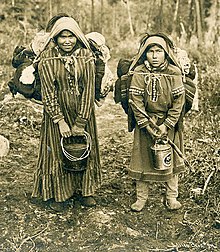Ahtna people

Chief Stickwan's two daughters holding buckets and carrying burdens on backs with trumplines, Klutina-Copper Center band of Lower Ahtna, 1903
|
|
| Total population | |
|---|---|
| (500) | |
| Regions with significant populations | |
| United States (Alaska) | |
| Languages | |
| Ahtna, English | |
| Related ethnic groups | |
| other Athabaskan peoples |
The Ahtna (also Ahtena, Atna, Ahtna-kohtaene, or Copper River) are an Alaska Native Athabaskan people of the Athabaskan-speaking ethnolinguistic group. The people's homeland called Atna Nenn', is located in the Copper River area of southern Alaska, and the name Ahtna derives from the local name for the Copper River. The total population of Ahtna is estimated at around 500.
Their neighbors are other Na-Dené-speaking and Yupik peoples: Dena'ina (west), Koyukon (a little part of northwest), Lower Tanana (north), Tanacross (north), Upper Tanana (northeast), Southern Tutchone (southeast, in Canada), Tlingit (southeast), Eyak (south), and Chugach Sugpiaq (south).
The name Ahtena, also written as Ahtna and Atnatana, translates as "ice people." In some documentation the Ahtna have been called Copper Indians because of their ancestral homeland located in the basin of the Copper River and its tributaries in southeastern Alaska. The word for the Copper River in Ahtna is 'Atna' tuu" (tuu meaning water). Thus, "Ahtna" refers to the People of the 'Atna' River (i.e. The Copper River). The named Yellowknife has also been used in reference to the Ahtna's copper-colored knives; however, another tribe, the Yellowknives, are also referred to as Copper Indians.
The Ahtna are an Athabaskan languages speaking tribe of the Subarctic cultural area, which classifies them as both Athabaskan and Subarctic Indians. Depending on the communities location along the Copper River, dialectal differences may occur. The Lower Ahtna (Ahtna'ht'aene) are near the river's mouth which opens into the Gulf of Alaska, the Middle Ahtna (Dan'ehwt'aene) are upriver a distance, and the Upper Ahtna (Tate'ahwt'aene) live on the upper parts of the river. The Tanaina people of the west are their closet linguistic relatives. About 80 Ahtnas are believed to still speak the language. In 1990 a dictionary was published by university linguist James Kari, in order to preserve the language. Several years later, the Ahtna People themselves published a noun dictionary of their language (The Ahtna Noun Dictionary of Pronunciation Guide: Ahtna Heritage Foundation/Ahtna, Inc., 1998, 2011 Revised).
...
Wikipedia
